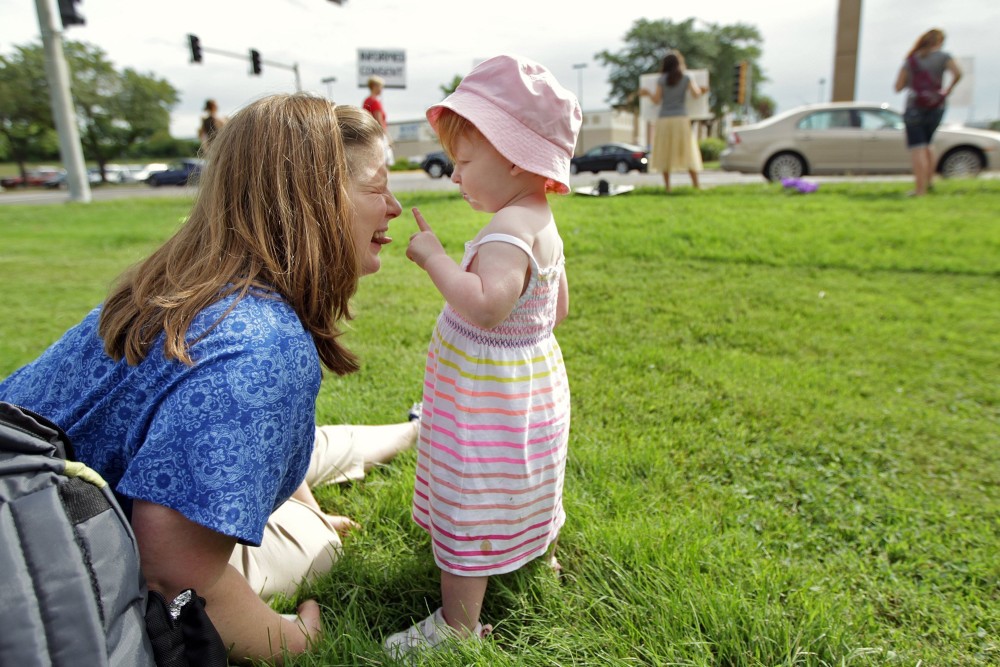By Cynthia M. Allen
Fort Worth Star-Telegram
WWR Article Summary (tl;dr) As Cynthia Allen puts it, “Despite all the parenting books and pop culture representations that would have you believe otherwise, not every moment is overflowing with joy and fulfillment.”
Fort Worth Star-Telegram
“We’re going to walk you to your car,” said the smiling woman in front of me at the grocery store, as she and her husband took the bags from my hands.
She had seen me struggling to balance my toddler, who was fussing over her balloon, on my hip while pushing my infant in her stroller and carrying three sacks of groceries to my minivan.
I was grateful for the help, but in that moment I remember thinking, “How did this become my life?”
I know I’m not alone in that sentiment, the sense that after children, life is somehow out of your control.
Most mothers I know, even the ones who disguise it well, have at least one day when the circumstances of their lives, the third middle-of-the-night nursing, the grocery store toddler meltdown, the constant carting of preteens to after-school activities, the inability to read an entire news article without interruption, really get to them.
Motherhood is hard
Despite all the parenting books and pop culture representations that would have you believe otherwise, not every moment is overflowing with joy and fulfillment.
There are days, months even, of dissatisfaction that force you to question your abilities and choices.
Couple that with exhaustion, reduced mental stimulation and the failure to take regular showers or fit into your pre-pregnancy wardrobe, and you have a recipe for limitless frustration.
There’s a reason why some studies show that the arrival of a child can dramatically reduce a person’s happiness, at least for a time.
A friend of mine with an MBA compared being a mom with her previous job.
“There are no evaluations, no feedback. You’re flying blind. You have no idea if you’re doing well or just OK, because no one is there to critique your work.”
That’s a difficult transition to accept, especially for mothers who abandoned or postponed careers to devote themselves exclusively to being a mom.
We once ran meetings and wrote speeches for high-level officials. Now we run car pool and write the alphabet for our toddlers.
Even those women who return to work, whether full time or part time, will concede that their attentions are divided, making career advancement more difficult.
It’s understandable that we’re not always delighted by our daily lives.
Today’s feminists would argue that these feelings, these sometimes difficult realities, are patently unfair.
Why are women forced to conform to some ideal of motherhood that demands not only their devotion to it but their adoration of it?
There is even a self-described movement of mothers who are overcome with regret for well, being mothers.
A recent article in Marie Claire sought to capture the ethos of “a growing and largely ignored group of mothers all over the world who are confessing their regret over having children.”
These feelings of regret stem from a sense of lost opportunity, unfulfilled dreams, boredom and disappointment with the drudgeries of raising kids.
One mother described her experience this way: “I had to grit my teeth and live with the results at first, and now it’s just my reality.”
I won’t dispute for a second that sentiments of regret are legitimate and at times justifiable.
But calling motherhood altogether regrettable seems to miss entirely the profundity of its purpose.
No vocation I am aware of requires more of someone than being a mom.
Indeed, becoming a mother demands physical sacrifice from its earliest stages, and the mental and emotional demands increase as our children grow.
So much self-giving can be draining. It can fuel resentment, especially if you don’t find the little victories of child-rearing smiles particularly rewarding.
But no job is more important than the shaping of human minds, hearts and souls, that’s precisely what motherhood is.
It’s a shame society sees decreasing value in this role, and it’s even worse that some women have advanced common feelings of frustration into a movement of regretful motherhood.
There’s plenty about being a mom that we may come to regret, but there’s nothing regretful about being a mom.
___
ABOUT THE WRITER
Cynthia M. Allen is a columnist for the Fort Worth Star-Telegram














































































































































































































































































































































































